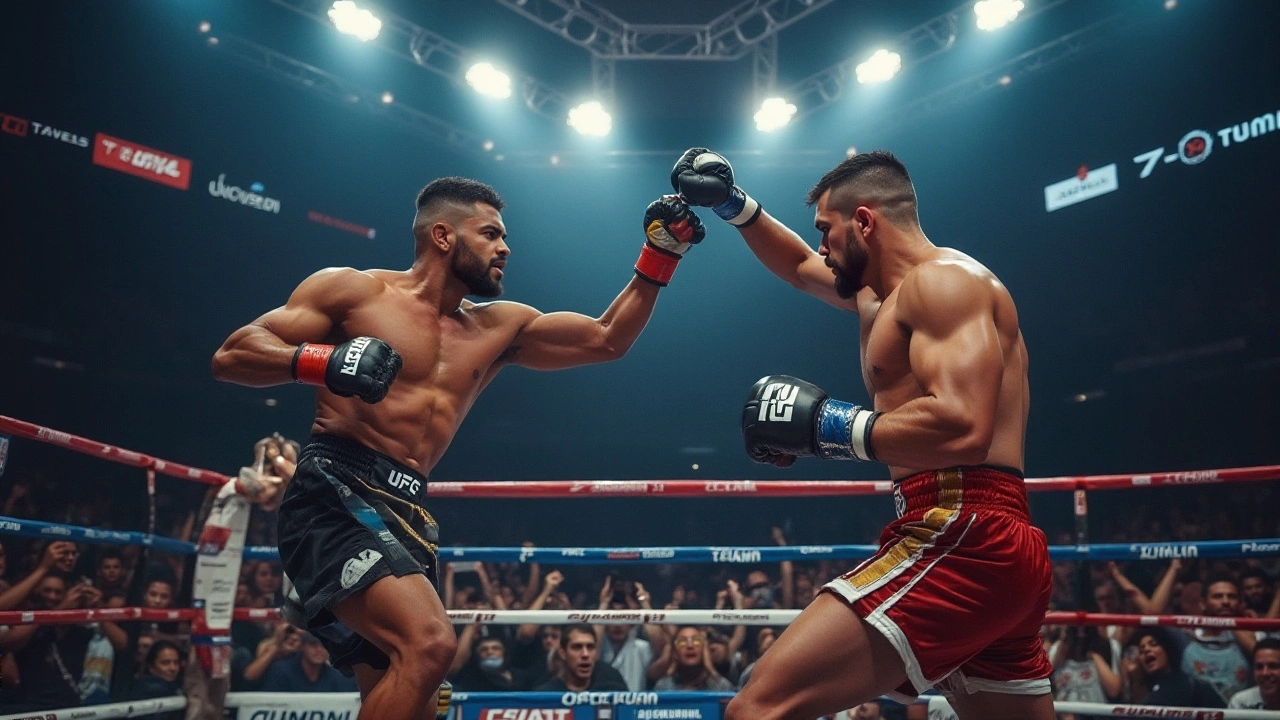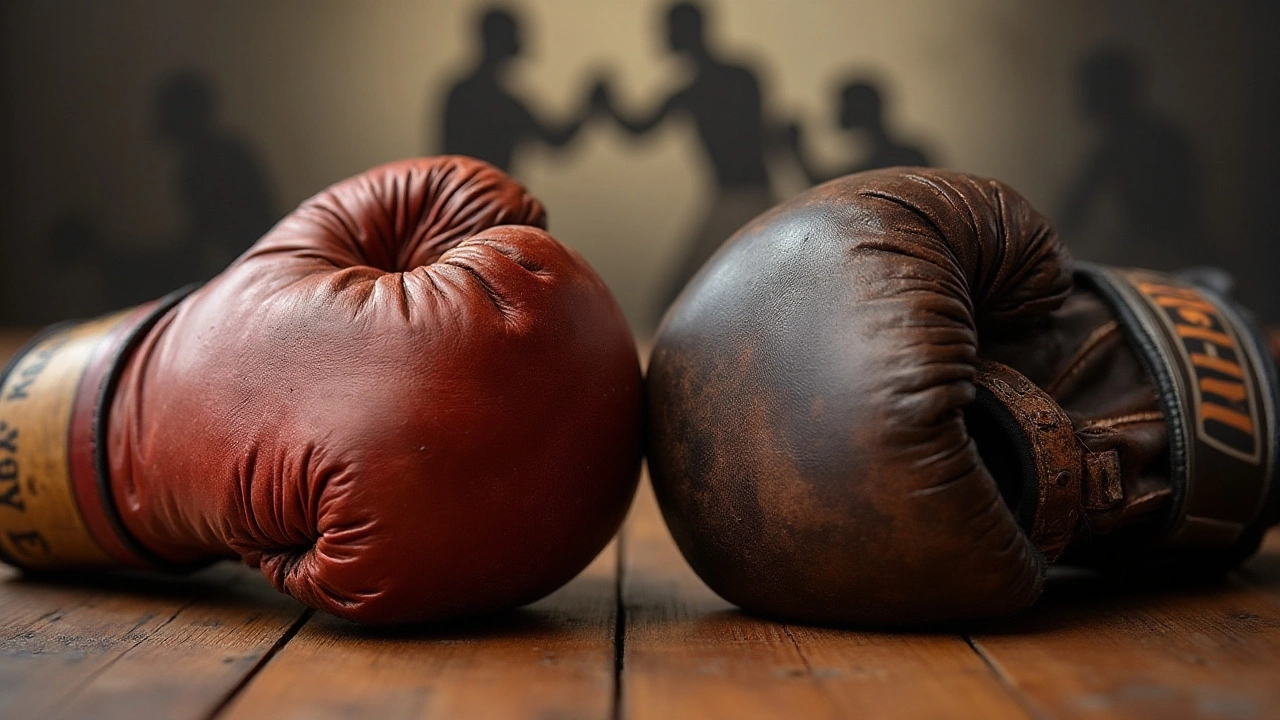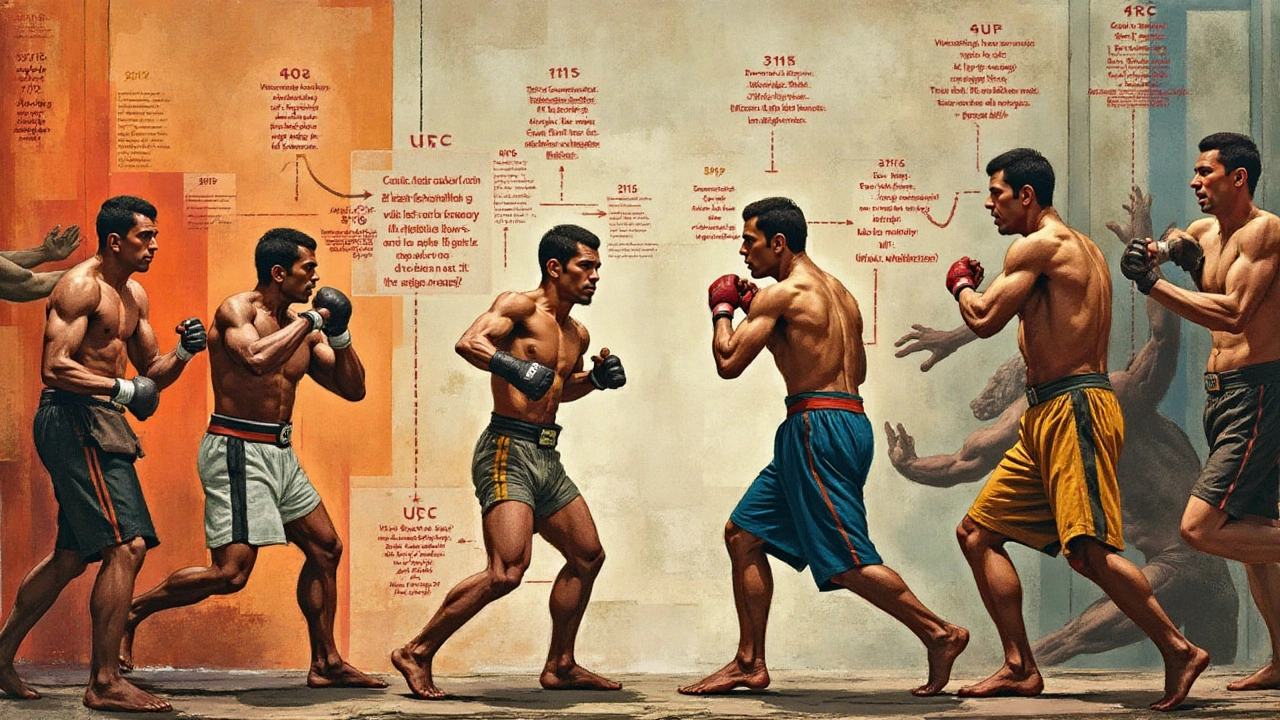UFC vs Boxing: Differences and Similarities Explained

In the realm of combat sports, UFC and boxing stand out for their electrifying matches and dedicated fan bases. Yet, they are often compared or even confused, leading to the question: 'Is UFC considered boxing?'
Both sports showcase incredible athletes, but they couldn't be more different in form and execution. This article aims to clarify these differences, offering a clearer understanding of what each sport entails and why they should be recognized for their unique characteristics.
By exploring their origins, rules, and techniques, we will unravel the complexities that make UFC and boxing distinct from one another. So, fasten your gloves and join us on this informative journey into the world of combat sports.
- Understanding UFC and Its Origins
- Differentiating Boxing from UFC
- Comparative Analysis of Techniques and Rules
- Conclusion: Why the Distinction Matters
Understanding UFC and Its Origins
The Ultimate Fighting Championship, commonly known as the UFC, is a global leader in the fast-growing world of mixed martial arts (MMA). Founded in November 1993, UFC initially sought to identify the most effective martial art in a real fight situation by pitting practitioners of different disciplines against each other. This endeavor echoed the centuries-old concept of competitive fighting but with a modern twist that quicky captivated audiences worldwide.
The idea of UFC was born from the minds of Art Davie, a businessman, and Rorion Gracie, a member of the famed Brazilian Gracie family known for developing Brazilian jiu-jitsu. Their aim was to showcase the effectiveness of jiu-jitsu while simultaneously bringing attention to the sport as a whole. The first UFC event, held at the McNichols Sports Arena in Denver, Colorado, was a no-holds-barred spectacle unlike anything seen before. Fighters from diverse backgrounds—kung fu, jujitsu, sumo, and boxing—battled it out, introducing audiences to a brutal yet fascinating form of sport.
"The UFC was a human experiment, a theory, and we were trying to find out who was the toughest among all those great disciplines," said Art Davie, reflecting on the venture's inception.
Over time, UFC evolved significantly. Early criticisms focused on the lack of rules, which many believed glorified violence. Responding to these concerns—and facing potential legislative bans—UFC instituted a codified set of rules and weight classes, aligning more closely with traditional combat sports like boxing. These changes not only addressed concerns about fighter safety and legality but also polished the rough edges of the sport, making it more palatable for mainstream audiences while still preserving the raw competitive spirit that attracted fans.
By the early 2000s, the UFC was experiencing a renaissance. With the acquisition by the Fertitta brothers and Dana White as president, UFC embraced marketing tactics and reality television programming through 'The Ultimate Fighter,' which dramatically expanded its reach and popularity. Once considered a niche sport, UFC has become a multi-billion-dollar industry, broadcasting events in over 150 countries and territories. The eclectic mix of fighting styles seen in the octagon—from muay thai to wrestling—demonstrates the versatility and adaptability central to UFC's success.
Today, UFC is widely recognized as the pinnacle of combat sports, offering substantial prize money, endorsements, and fame for fighters willing to test their might against some of the world's fiercest athletes. Its journey from controversial beginnings to mainstream acceptance tells a story of adaptation and allure, echoing the timeless human love for contest and the spectacle of athletic prowess.

Differentiating Boxing from UFC
The world of combat sports offers an array of disciplines, each with its own rules and unique attractions. Boxing and UFC are two of the most recognizable names in this sphere, yet their paths, philosophies, and practices differ significantly. Understanding these differences begins with a grasp of the fundamental rules. Boxing is a classic sport with a rich history going back centuries. It involves only punching techniques, defined by a set of strict rules and categories, such as flyweight or heavyweight. Fighters wear padded gloves and compete in rings, where the primary objective is to knock out the opponent or score more points based on accurate hits. In contrast, the UFC, encapsulated in the broader category of Mixed Martial Arts (MMA), encompasses a vast variety of martial arts disciplines. Fighters are allowed to use striking and grappling techniques borrowed from different combat styles such as judo, wrestling, and Brazilian jiu-jitsu. The UFC fights take place in an octagonal cage, which adds to the raw, untamed aura of the sport.
Another critical differentiating factor between boxing and UFC lies in the fight duration and scoring. In boxing, matches typically consist of up to twelve three-minute rounds, with fighters earning points from a panel of judges, assuming there is no knockout. The refined rules on point scoring are based on clean punching, effective aggressiveness, and defense. Conversely, UFC bouts generally comprise three five-minute rounds, with championship or main event fights extending to five rounds. The UFC's scoring is more comprehensive, taking into account strikes, takedowns, control of the cage, and attempted submissions. The presence of judges in both sports might seem a binding thread, but the parameters for victory paint a vividly different picture. As renowned boxing commentator Teddy Atlas once said,
"Boxing is chess with punches, while in the octagon, it's a battle of diverse tactics and instincts."
Physical conditioning also plays a distinctive role in each sport. Boxing requires incredibly specialized endurance, focusing on relentless footwork, swift hand speed, and impeccable head movements, all important for evading and delivering punches effectively. Fighters spend countless hours honing their agility and rhythm in handling body punches and headshots. On the flip side, MMA athletes, including those competing in the UFC, engage in an all-around development strategy. Training sessions include not just striking and cardio enhancement, but also ground techniques critical for grappling. Flexibility, awareness, and an interdisciplinary understanding of fighting styles are necessary to succeed. This diversity makes UFC training programs richly varied and more physically demanding in many respects. Strength conditioning, simulated combat scenarios, and mental resilience exercises are frequently incorporated into sessions, portraying how the sport thrives on versatility.
Finally, it's essential to recognize the unique cultural footprint these sports leave behind. Boxing carries the weight of tradition, often celebrated in historical venues and accompanied by a ceremonial atmosphere. The images of Muhammad Ali dancing across the ring or Mike Tyson's menacing presence remind us of boxing's narrative of individual glory and tactical brilliance. On the other hand, the UFC is relatively modern and enjoys a significant following through digital platforms, hosting grand spectacles often characterized by elaborate entrances and boisterous crowds. UFC fighters aim to capture attention with a blend of showmanship and grit, echoing the contemporary culture of unpredictability and spectacle.
The comparison of boxing and UFC involves recognizing both subtle nuances and glaring differences. Each sport demands its own brand of skill, strategy, and mental toughness. Whether traditional and strategic or hybrid and raw, both have cemented themselves in the annals of combat sports, each drawing its own dedicated fanbase. Understanding these differences not only fosters appreciation but also sets correct expectations for spectators and enthusiasts alike.

Comparative Analysis of Techniques and Rules
When evaluating the dissimilarities and similarities between UFC and boxing, it becomes essential to dissect their defining elements: techniques and rules. Understanding these can give fans and newcomers a clearer picture of what makes each sport unique. Boxing, with its rich history, centers entirely on standout punching skills, demanding fighters to master a combination of jabs, uppercuts, and hooks. The sport is as much about defense as offense, requiring quick footwork and strategic head movements to evade hits.
Boxers typically train for years to perfect these select moves and to cultivate endurance for twelve grueling three-minute rounds. They must adhere to strict rules, such as limiting strikes to above the waist and wearing specific gloves that standardize the bouts no matter the arena. Despite its apparent limitations, boxing thrives on precision, discipline, and a rich strategic undertone that captivates audiences globally.
On the flip side, the Ultimate Fighting Championship (UFC) introduces a whole new level of complexity. Originating from mixed martial arts (MMA), UFC fights incorporate an eclectic mix of combat styles including wrestling, Brazilian Jiu-Jitsu, Muay Thai, and more. With such diverse techniques, fighters are not only trading punches but also engaging in ground battles, employing kicks, and using submission holds that require immense agility and skill.
This broad repertoire means UFC fighters must be versatile, adapting to each opponent while leveraging their unique strengths. The octagon, where these matches take place, offers its own set of challenges, with a unique dynamic where athletes pivot not just to attack, but to escape from submission traps.
The regulatory framework for UFC is distinct from boxing. The format usually consists of three five-minute rounds, or five in championship bouts. The fighters wear lighter gloves, which influences the pace and the impact of strikes. While each sport is governed by rules to ensure safety and fair play, the complexity and scope of UFC's rulebook reflect its varied nature, requiring athletes to be both tactically savvy and aware of the intricate regulations that control the fight.
In capturing the spirit of both sports, it is worth noting the words of John McCarthy, a renowned UFC referee:
'A mixed martial artist must embrace the entire range of skills from around the world, combining them seamlessly to dominate their opponent.'This philosophy succinctly highlights how UFC offers a dynamic, multifaceted alternative to the focused, punch-centric spectacle of boxing.
A deep dive into the rules reveals a curious reality: while boxing prides itself on refined combat articulated through punches alone, UFC allows for a celebration of diverse martial arts forms. This variance not only shapes the fighters’ approach but also enriches the viewer's experience, offering layers of unpredictability with each encounter.

Conclusion: Why the Distinction Matters
Grasping the nuance between UFC and boxing is more than an academic exercise. It's about appreciating two unique sporting traditions that have culturally defined combat sports for millions around the globe. The term 'boxing' might imply a certain hierarchy or prestige, yet both boxing and UFC, with its roots in mixed martial arts, contribute equally thrilling dynamics to the landscape of sports entertainment.
While they share the same primal nature of hand-to-hand combat, their differences in restrictions and rules are paramount. Boxing's reliance on upper body strength and punching power contrasts sharply with UFC's wide-ranging arsenal which includes grappling, kicking, and submissions. This broad spectrum in UFC nurtures a different type of athlete—one that isn't just disciplined in one form, but often several forms of martial arts.
Recognizing these differences matters not only to the athletes but to the enthusiasts who invest their time and energy into these sports. Misconceiving UFC as a form of boxing may undercut the skills and dedication of a fighter who must train across different martial disciplines. As Dana White once emphasized,
"The beauty of UFC lies in its unpredictability, as fighters are trained to adapt and overcome an entire repertoire of combat techniques."This unpredictability offers a different palette of excitement—for fans, it means a deeper analysis of strategies, and for betting enthusiasts, a more intricate wagering landscape.
Moreover, boxing has centuries of history and is often seen as more traditional, while UFC, with its modern roots in the early 1990s, presents a fresh and evolving form of entertainment. Each caters to different audience preferences; while boxing aficionados revel in the technical footwork and power punches, UFC fans are captivated by the sheer variety and rapidly shifting dynamics of a bout. Upholding their distinction ensures that both can thrive independently and continue to grow in unique directions.
Examining their variance with clarity not only enhances appreciation for the sports but also promotes a richer conversation around them. It encourages people to celebrate what each has to offer, individually. So, every time the bell rings in boxing, and every time the buzzer sounds in the octagon, we hopefully see them as separate symphonies in the world of sports. They play harmoniously distinct notes that cater to the intricate tastes of fight enthusiasts worldwide, each deserving recognition in its tale.
